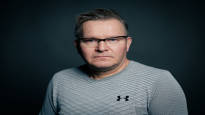Toni Kroos, the last GDR-born sports megastar, ends directly at the brightest peak of his sport, writes Pekka Holopainen.
Pekka Holopainen sports reporter
Sydney Convention and Exhibition Center, September 27, 2000. The Greco-Roman 130kg final goes to overtime, and Aleksandr Karelin realizes that he has made an assessment error. Unbeaten throughout his international career since 1987, the brightest flame of the sport from Siberia has gone out a long time ago, and the American Rulon Gardner smell blood.
In overtime, Gardner’s cross belt hold holds, Karelinin, 33, breaks free. One of the greatest careers in the history of sports ends in a downright humiliating defeat to an opponent that a normal Karelin would have put in a package in an instant, so to speak.
Quite a spring bang
This confusing and memorable spectator experience in Australia came to mind when a megastar of all sizes and shapes of sports Toni Kroos dropped quite a spring bomb a week ago: he will end his career as soon as the home team’s European Championship in Germany ends. If all goes well for the Germans, they won’t finish until the final day on July 14.
In three days, it will be 10 years since the day that Kroos, the last sports megastar born in the GDR, considers the most meaningful of his career. That’s when Real Madrid announced his transfer, which turned out to be one of the most profitable cooperation patterns in the entire football history, even on the scale of that club.
94 percent
So far, Kroos’ streak has resulted in four Spanish titles and four Champions League wins, along with a clinical 94% pass success average in 463 games. The greats tell the essentials about the process, in which Kroos has even been the single most essential factor in his 10 Real seasons.
There is one obligation left in the white shirt of Real, i.e. the Champions League final against Borussia Dortmund. In another classic white knot, the work will continue after that for at most one and a half months.
Saturday’s final will be played at Wembley. There, Kroos’ National Team career was thought to have ended on June 29, 2021, when England knocked out Germany in the quarterfinals of the European Championship. The surprise return of the midfield genius means that Germany still has three players from its young World Cup team of 14 years ago, completely exceptionally – Kroos, Manuel Neuer and Thomas Müller – involved in the European Championships in big roles.
In the cases of Kroos and Neuer, game-wise, in the case of Müller, perhaps more mentally.
Of course, this is not about world record figures, because Lothar Matthäus played in the World Cup every 16 years and Teemu Selänten 23 years passed from the first to the last awards.
No matter how things go in the summer between Real and Germany, Kroos has already given the most difficult pass of his career: he will end the world’s greatest form of sport at the absolute top, healthy and a year older than the humiliated Karel in Sydney 2000.
Different examples
Other examples are much more familiar. Stuck in a hopeless spiral of injury Peter Forsbergraw many times over-hyped in the ring Muhammad Aliremaining at his starting weight in his last Olympic Games Naim Suleimanoglujumping all over the place Simon Ammann and so on.
Top sportsmanship is not only a profession, but above all an identity, the abandonment of which is doubtful and scary. Most comeback projects don’t go quite the same way From Michael Jordanwho returned from his hiatus from baseball in 1995 to lead the Chicago Bulls to three more NBA championships.
Among the Finns, Kroos’ trick has been fully successful from the age of 24 Marjo Matikainen and Sampa from Laju and half Finns Nico from Rosberg. Mark Spitz22, left the pool in 1972 after winning seven Olympic golds in Munich.
35 years later, the unparalleled professional career of Toni Kroos, who grew up on the shores of the Baltic Sea, began in that city, Bayern’s second team.
